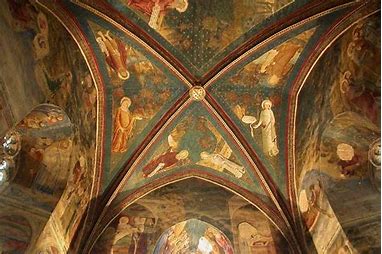
Born as Pierre Roger (Rogers, Rosiers) Pope Clement was the fourth pope at Avignon. Before that he was born about 1291 at Chateau de Maumont, in Limousin, half-way between Paris and the Pyranees. His father was the lord of Maumont-Rosiers-d’Egletons.
Pierre was educated by the Benedictine order starting at ten years of age. After six years, he attended the Sorbonne in Paris. To help him with expenses, he received a benefice from his post as Prior of St. Pantaleon in Limoges.
After studying canon law and theology for years, the Chancellor of Paris allowed him to receive a doctorate in theology, a chair (a job as a professor) and a license to teach. He lectured publicly defending and promoting St. Thomas Aquinas.
He earned acclaim by being against Defensor Pacis, a document which proclaimed that government should be what the people want. In 1315, Pierre wrote a treatise against the document, condemning its principles and defending the rights of Pope John XXII.
In June 1326, Pierre became the Abbot of Fecamp, a royal abbey. Due to its location in Normandy, Pierre became a feudal subject of England. At the same time, he was also friends with King Charles IV of France. On the death of the king in 1328, Philip VI came to power. Pierre was sent to England to get King Edward III to pay homage to Philip. He failed.
At the end of 1328, Pierre became the Bishop of Aaras, in the far northern portion of France. This meant he became a royal councilor for King Philip. But he held that for only a year because…
He was nominated archbishop of Sens. From here he appeared at an assembly of clergy at Vincennes where he argued on behalf of ecclesiastical authority.
By 1333, he was archbishop of Rouen. As archbishop, he was a Peer of France. In this capacity, Pierre was a member of an embassy sent by King Philip to his son the Duke of Normandy ordering him to take up the cross and serve in a crusade to the Holy Land.
In December 1338, Pierre became a cardinal-priest by Pope Benedict XII. By April 1342, Benedict died.
Papacy 1342-1352
Immediately, Philip sent his son, the Duke of Normandy, to Avignon to press for the candidacy of their friend, Pierre Roger. The voting was swift and within two days, Cardinal Roger had been elected. In one of his earliest comments, the new Pope Clement VI, promised a gift for every cleric who presented himself at Avignon. Almost 100,000 showed up. Members of the curia insisted that other new popes did not give out gifts like that. Clement retorted “Our predecessors did not know how to be pope.”
Clement’s first consistory was 20 September 1342. He nominated three nephews, one Italian and the rest Frenchmen to be the ten new cardinals. When two died very soon after, he nominated Frenchmen to replace them.
The Romans realized, by now, that they had lost something intrinsic to Rome. So, they invited the curia to return. Clement refused. As a concession, he reduced the interval between Great Jubilees from 100 to 50 years for the Romans. Then he went back to enlarging the Palace of Popes in Avignon.
As pope, he had several major challenges.
1. He provided arguments for the power of the pope in the use of indulgences. This became a major problem two hundred years later.
2. The Bubonic Plague hit Europe and wiped-out millions. Clement stayed in Avignon, a dangerous choice, and supervised sick care, burials and the pastoral care of the dying. Six cardinals died in 1648. He replaced them with a nephew, two cousins, three Italians and a handful of Frenchmen. The citizens tended to blame the Jews for the plague. Clement urged the clergy to protect the Jews just as he did.
3. The papacy had been struggling with Emperor Louis IV. A civil war in the Holy Roman Empire showed how ruthless Louis was. When Charles of Luxembourg was elected as a rival king, with the help of Clement, Louis did not back down. But suddenly he died. Charles became emperor and a schism in the empire was avoided.
4. Disputes with Edward III of England continued as that king encroached on ecclesiastical jurisdiction.
5. Negotiations with Byzantium for reunion failed.
6. He threatened anathemas and interdicts on the Kings of Poland and Bohemia.
Pope Clement lived an open and generous lifestyle. He brought artists and musicians into the palace of popes to surround the staff with beauty. He spent an absolute fortune on his lifestyle and the palace. One contemporary wrote, “A fine gentleman, a prince munificent to profusion, a patron of the arts, but no saint.”

Recent Comments